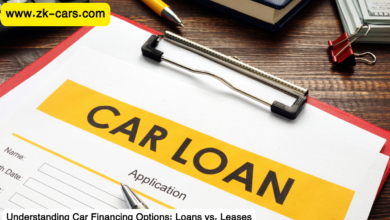How to buying your first car: A Step-by-Step Guide

Buying your first car can be both thrilling and daunting. With a vast array of options on the market, it’s essential to approach the process with a well-informed strategy. This comprehensive guide will provide you with step-by-step guidance, from setting a budget to negotiating the best deal, ensuring a smooth and satisfying car-buying experience.
How to buying a car for the first time?
1. Determine Your Budget
The first step in buying a car is determining how much you can afford. Consider the following factors:
- Down payment: How much can you save for a down payment? A larger down payment will reduce your monthly payments and the overall cost of the car.
- Monthly payment: How much can you comfortably afford to pay each month?
- Total cost of ownership: Remember to factor in additional costs such as insurance, fuel, maintenance, and registration fees.
- Interest rates: Research current interest rates and consider pre-approving for a car loan to get a better idea of your monthly payments.
2. Do Your Research
- Identify your needs: Consider your lifestyle and what you need from a car. Do you need a family-friendly SUV, a fuel-efficient sedan, or a sporty coupe?
- Make a list of must-have features: Decide which features are important to you, such as safety features, technology, or fuel efficiency.
- Research car models: Use online resources like Edmunds, Kelley Blue Book, and Consumer Reports to compare different models, read reviews, and get pricing information.
- Test drive: Schedule test drives with multiple dealerships to compare different vehicles and see how they feel behind the wheel.
3. Get Pre-Approved for a Car Loan
Getting pre-approved for a car loan before you start shopping can save you time and give you a better idea of your budget. Contact your bank or credit union to get pre-approved.
4. Choose a Dealership
- Read reviews: Check online reviews to find dealerships with a good reputation for customer service.
- Compare prices: Get quotes from multiple dealerships to ensure you’re getting the best deal.
- Negotiate: Don’t be afraid to negotiate the price of the car and any additional fees.
5. Inspect the Vehicle
- Check the vehicle history report: A vehicle history report can provide valuable information about the car’s past, such as accidents, damage, and ownership history.
- Perform a thorough inspection: Look for any signs of damage, wear and tear, or rust.
- Test drive again: Take the car for a second test drive to make sure everything is working properly.
6. Finalize the Deal
- Negotiate the final price: Work with the dealership to negotiate the final price, including the trade-in value of your old car.
- Review the paperwork carefully: Make sure you understand all the terms and conditions of the sales contract before signing.
- Arrange financing: If you’re financing the car, work with the dealership to finalize the loan terms.
7. Get Insurance
- Shop around for insurance quotes: Compare quotes from multiple insurance companies to find the best coverage at the most affordable price.
- Understand your coverage: Make sure you understand the different types of car insurance coverage and choose the options that best suit your needs.
Tips for First-Time Car Buyers
- Consider a certified pre-owned vehicle: Certified pre-owned vehicles often come with warranties and have undergone inspections.
- Don’t be afraid to walk away: If you’re not happy with the deal, don’t be afraid to walk away and continue your search.
- Ask for help: Don’t hesitate to ask for help from friends, family, or a trusted mechanic.
Additional Tips for Buying a Used Car
- Check for recalls: Use the National Highway Traffic Safety Administration (NHTSA) website to check for any recalls on the vehicle you’re interested in.
- Get a mechanic’s inspection: Have a trusted mechanic inspect the vehicle before you buy it.
- Negotiate the price: Used cars often have more negotiating room than new cars.
Additional Tips for Buying a New Car
- Consider leasing: Leasing can be a good option if you like to have a new car every few years.
- Take advantage of incentives: Many dealerships offer incentives, such as rebates and low financing rates, to new car buyers.
- Customize your car: Most manufacturers offer a variety of customization options to personalize your new car.
Conclusion
Buying your first car is a big decision, but with careful planning and research, you can find the perfect vehicle to meet your needs and budget. By following these steps, you can feel confident that you’re making a wise investment.
FAQ:
Q: How much should I save for a down payment?
A: A down payment of 20% or more is generally recommended to get a lower interest rate and monthly payments. However, even a smaller down payment can be helpful.
Q: How long does it take to get pre-approved for a car loan?
A: The pre-approval process typically takes a few days. You’ll need to provide your financial information, such as your income, credit score, and employment history.
Q: What should I look for when inspecting a used car?
A: When inspecting a used car, look for signs of damage, such as dents, scratches, or leaks. Check the engine, transmission, brakes, and tires. Also, test drive the car to see how it handles and performs.
Q: How can I negotiate a better price for a car?
A: Do your research and know the fair market value of the car you’re interested in. Be prepared to walk away if you’re not satisfied with the price.
Q: What is the difference between a lease and a purchase?
A: With a lease, you’re essentially renting the car for a set period of time. With a purchase, you own the car outright. Leasing can be a good option if you like to have a new car every few years, while purchasing can be a better option if you plan to keep the car for a long time.
Q: What are some common car insurance coverages?
A: Common car insurance coverages include:
- Liability insurance: Covers bodily injury and property damage caused by an accident you’re at fault for.
- Collision insurance: Covers damage to your car if it’s involved in an accident.
- Comprehensive insurance: Covers damage to your car caused by theft, vandalism, or natural disasters.
- Uninsured/underinsured motorist coverage: Protects you if you’re involved in an accident with an uninsured or underinsured driver.
Q: What are some tips for maintaining your car?
A: Regular maintenance is essential for keeping your car running smoothly. Follow the manufacturer’s recommended maintenance schedule and have your car inspected by a mechanic regularly.
Q: Should I buy a new car or a used car?
A: The decision of whether to buy a new or used car depends on your budget and preferences. New cars come with warranties and often have the latest features, while used cars can be more affordable but may have higher mileage and potential mechanical issues.
Q: How often should I get my car serviced?
A: Refer to your car’s owner’s manual for the recommended service intervals. Generally, you should have your car serviced every 5,000 to 10,000 miles.
Q: What is the best time of year to buy a car?
A: The end of the year is often a good time to buy a car, as dealerships may be trying to meet sales quotas. However, prices can fluctuate throughout the year, so it’s always a good idea to shop around and compare deals.
Q: How can I save money on car insurance?
A: There are several ways to save money on car insurance, such as:
- Increasing your deductible: A higher deductible can lower your premiums.
- Taking a defensive driving course: Completing a defensive driving course can qualify you for discounts.
- Bundling your insurance policies: If you have other insurance policies with the same company, you may be eligible for discounts.
- Comparing quotes: Get quotes from multiple insurance companies to find the best deal.
resources :
Here are some valuable resources to help you navigate the car-buying process:
- Car Buying Tips: https://www.carbuyingtips.com/ offers a wealth of information on everything from setting a budget to negotiating the best deal.
- Bankrate Auto Loans: https://www.bankrate.com/loans/auto-loans/ provides information on auto loans, which can be a crucial part of the car-buying process. Understanding financing options can help you negotiate a better price.
- AutoCheck: https://www.autocheck.com/vehiclehistory/ is another popular option for vehicle history reports. It provides detailed information about a vehicle’s history, helping you make informed decisions.
- Carfax Dealership Search: https://www.carfax.com/Dealerships-Richlands-VA_c10371 allows you to search for dealerships in a specific location. You can use this tool to find dealerships with high customer ratings.
You might like : The Best Budget Cars for First-Time Buyers




